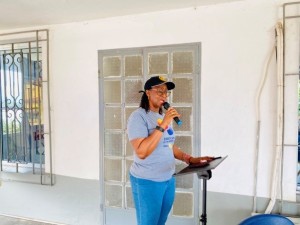By Foday Moriba Conteh
During a snappy ceremony held on Saturday 26th August, 2023 at the Well Women Clinic, on Congo Cross in Freetown, the Rotary Club of Calgary West, Canada and Rotary Club of Freetown launched a project titled: “Cervical Cancer: Screening, Diagnosis and Treatment for Women in Sierra Leone.”
The project which seeks to screen and treat 4,000 women with Cervical Cancer in Freetown and Bo District, within a period of two years, will be implemented by the Well Woman Clinic MEP Trust with support from the Rotary Club of Calgary West, Canada and Rotary Club of Freetown.
Welcoming the gathering, the Chief Executive Officer at Well Women Clinic, Jennifer Renner-Thomas applauded Rotary Club of Calgary West, Canada and Rotary Club of Freetown for choosing her clinic to implement the project in the country.
She said that the Well Woman Clinic was born out of love, adding that before her sister died from breast cancer her wish was to make known to everybody in the country about the importance of early detection , furthering that since the establishment of the Clinic they have been working tirelessly towards fulfilling her wish.
Jennifer Renner-Thomas noted that the Clinic has already started its Cervical Cancer program but said with the support from Rotary they are going to do much more, adding that the Clinic’s Cervical Cancer initiative include awareness, screening but said with this partnership between the Well Woman Clinic and Rotary, through the project, such will increase Cervical Cancer: screening, diagnosis and treatment for Women in the country.
The President of Rotary Club of Freetown, Sybil Bailor, said that the Rotary International President-elect, R. Gordon R. McInally ,announced Rotary’s theme for this year, “Create Hope in the World,” stating that the goal is to restore hope to help the world heal from destructive conflicts and to help achieve lasting change.
“What better way to bring hope to the women of Sierra Leone than Cervical Cancer: Screening, Diagnosis and Treatment for Women in Sierra Leone Project that we will be embarking on for the next two years,” she maintained.
Sybil Bailor said Rotary is delighted to partner with the Well Woman Clinic towards the implementation of the project in the country.
During her presentation on the project, a member of the Rotary Club of Calgary West, Dr. Nketti Johnston-Taylor, said the project, which is worth about 76,135.00 United State Dollars is geared towards developing and implementing a sustainable, effective, accessible, and affordable Cervical Cancer screening and treatment in the country based on WHO guidelines that fits within the local context and will be implemented in Freetown and Rural Areas (Bo).
Commenting on the objectives of the training, she said as part of the Project, medical staff and community health workers will be trained on how to screen, treat and monitor (early detection training).
Dr. Nketti Johnston-Taylor said that the Project will also enhance raising awareness at community level on Cervical cancer, its causes, different stages, screening, and treatment availability and building screening and diagnostics capabilities at the Well Woman Clinic including the introduction of the HPV rapid testing – Using the GeneExpert (1hr) and visual Inspection of the Cervix Using Acetic Vinegar (VIA) and finally building the treatment capabilities at the Clinic of Cervical Cancer using thermo coagulation using the Liger thermal coagulator.
Underscoring the reach of the program, she said, the project is expected to last for 2 years during which a minimum of 70 medical and health workers (approx., 35 in Freetown and 35 in Bo) will be trained.
The Member of Rotary Club of Calgary also disclosed that through the project 4000 women in Bo and in Freetown will be screen for cervical cancer (approx., 1,500 in Bo and 2,500 in Freetown), provide effective treatment via Coagulation to every woman that test positive to the HPV and VIA screening and that the project will target women experiencing poverty, widows, persons living with HIV/AIDs, child-headed households, and single mothers and other marginalized women.





